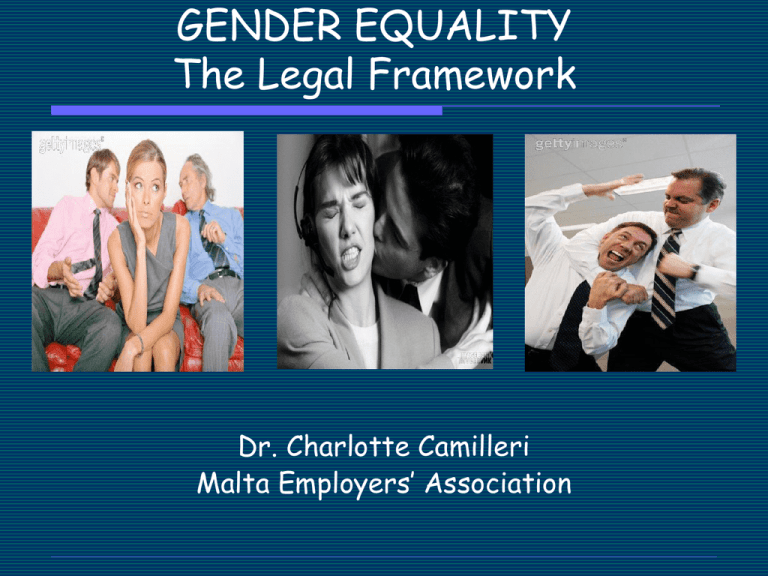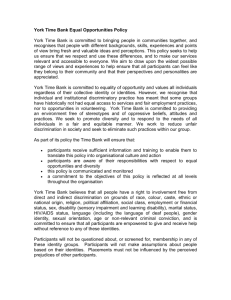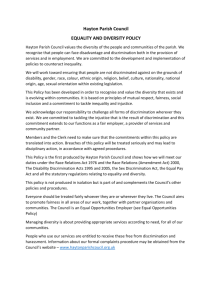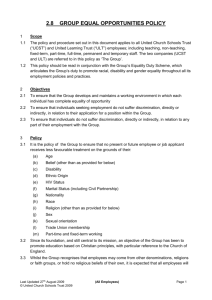gender equality act - Malta Employers' Association
advertisement

GENDER EQUALITY The Legal Framework Dr. Charlotte Camilleri Malta Employers’ Association EUROPEAN UNION Equality between women and men is one of the fundamental principles of Community law. The European Union's objectives is to ensure equal opportunities and equal treatment for men and women and to combat any form of discrimination on the grounds of sex. This implies improving the gender balance by promoting parental leave, maternity and working time. The Maltese Constitution At national level, the principle of ‘Non-Discrimination’ is enshrined in the Maltese Constitution “ affording different treatment to different persons attributable wholly or mainly to their respective descriptions by race, place of origin, political opinions, colour, creed or sex whereby persons of one such description are subjected to disabilities or restrictions to which persons of another such description are not made subject or are accorded privileges or advantages which are not accorded to persons of another such description” Protection from discrimination The Maltese Constitution is supreme Section 45 (1) “…no law shall make any provision that is discriminatory either of itself or in its effect” Section 45 (2) “…no person shall be treated in a discriminatory manner by any person …” Article 14 of Maltese Constitution Equality between men and women “The State shall promote the equal right of men and women to enjoy all economic, social and cultural, civil and political rights and for this purpose shall take appropriate measures to eliminate all forms of discrimination between the sexes by any person, organization or enterprise; the State shall in particular aim at ensuring that women workers enjoy equal rights and the same wages for the same work as men” Discrimination in Employment Articles 26 –32 of The EIRA (Chapter 452 of the Laws of Malta) Equality for Men and Women Act (Chapter 456 of the Laws of Malta) Definitions Discriminatory treatment – EIRA “ any distinction, exclusion or restriction which is not justifiable in a democratic society including discrimination made on the basis of marital status, pregnancy or potential pregnancy, sex, colour, disability, religious conviction, political opinion or membership in a trade union or in an employers’ association” Definitions Equality For Men and Women Act “ based on sex or because of family responsibilities and includes the treatment of a person in a less favourable manner than other person has been or would be treated on the grounds of sex or because of family responsibilities.” Article 4 (2) of Gender Equality Act Employers shall be deemed to have discriminated if such employers: Manage the work, give promotions, distribute tasks, offer training opportunities or arrange the working conditions on the basis of sex or family responsibilities. Alter the working conditions to the detriment of such employees, Neglect their obligation to suppress sexual harassment. GENDER EQUALITY ACT FAMILY RESPONSIBILITIES SEX Two forms of discrimination Might be difficult to determine the demarcation line between : Direct Discrimination Indirect Discrimination Direct Discrimination Ask this… Had the person in front of me been a man/woman would I have treated him differently? Would I have not offered him/her particular training? Indirect Discrimination Indirect discrimination occurs “where an apparently neutral provision, criterion or practice disadvantages a substantially higher proportion of the members of one sex unless that provision, criterion or practice is appropriate and necessary and can be justified by objective factors unrelated to sex.” Educational and Vocational Training Prohibition of discrimination on grounds of sex with regard to access to all types of vocational guidance, vocational training, and re-training. Applicable to : All educational establishments or any other entity providing vocational training or guidance and covers: - the access to any course, vocational training or guidance; - the award of educational support for students or trainees; - the selection and implementation of the curricula; and - the assessment of the skills or knowledge of the students or trainees Moreover… Educational establishments and entities providing vocational training are to ensure, within the limits of their competence, that curricula and textbooks do not propagate discrimination as well as are to fulfil their obligation to suppress sexual harassment. NOTA BENE Discriminatory adverts Conditions of employment Work of equal value Sexual harassment Victimisation Not discriminatory:- Where by reason of the particular occupational activities concerned, or of the context in which they are carried out, such a characteristic constitutes a genuine occupational requirement…. Burden of proof lies with person who alleges that there is a genuine occupational treatment Advertising The Advert CANNOT: Discriminate between job seekers Request info re private/family life UNLESS Employer can prove that work can only be performed by a person of a specific sex N.B Advertising includes disseminating info about the vacancy by word of mouth from person to person Article 26 of EIRA on Advertising It shall not be lawful for any person When advertising or offering employment or selecting applicants to subject them to discriminatory treatment To subject employees already in employment to discriminatory treatment with regards to conditions of employment Employers discriminate if…. Employee is given less favourable status than other on the basis of sex & family responsibilities in view of: Managing the work Giving promotions Distributing tasks Offering training opportunities Working conditions Alter conditions after employee invoked right under the law. Neglect the obligation to suppress sexual harassment Practical examples Cannot use the term handy man but handy person. Cannot use the term sales girl but sales person When advertising a vacancy for a particular post, cannot use a picture of a man or woman, but either both or nothing at all. Harassment It shall not be lawful for an employer or an employee to harass another employee or the employer by subjecting such person to any unwelcome act, request or conduct, including spoken words, gestures or the production, display or circulation of written words, pictures or other material, which in respect of that person is based on sexual discrimination and which could reasonably be regarded as offensive, humiliating or intimidating to such person. Sexual Harassment To subject other persons to an act of physical intimacy To request sexual favours from other persons To subject other persons to any act or conduct with sexual connotations, including spoken words, gestures or the production, display or circulation of any written words, pictures or other material, where the act, words or conduct is unwelcome to the persons to whom they are directed and could reasonably be regarded as offensive, humiliating or intimidating to the persons to whom they are directed Cont…Sexual Harassment The persons so subjected or requested are treated less favourably by reason of such persons’ rejection of or submission to such subjection or request, it could reasonably be anticipated that such persons would be so treated. Offence without prejudice to any greater liability under any other law be liable on conviction to a fine (multa) of not more than Lm1000 or to imprisonment of not more than 6 months or to both Victimization - Pay Back Time or Not… It shall not be lawful to victimize any person for having made a complaint to the lawful authorities or for having initiated or participated in proceedings for redress on grounds of alleged breach of the law or for having disclosed info, confidential or otherwise, to a designated public regulating body, regarding alleged illegal or corrupt activities being committed by his employer or by persons acting in the employer’s name and interests. Termination of Employment With regards to termination of employment, the law further safeguards against discriminatory treatment on the basis of marital status or pregnancy. Any condition enabling the employer to terminate employment during pregnancy or on her contracting marriage is illegal Redress Complaint to the Industrial Tribunal within 4 months from alleged breach. If Tribunal is satisfied – may take measures it deems fit National Commission for the Promotion for Equality National Commission for the Promotion of Equality for Men and Women (NCPE) Members of NCPE are appointed by the Prime Minister. NCPE is composed of: Commissioner & Six other members (at least 3 of whom shall be women) Hold office for a period of 2 years Functions of the NCPE Identify, establish and update all policies directly or indirectly related to issues of equality for men and women Identify needs of disadvantaged persons by reason of their sex Monitor implementation of national policies Liaise and ensure coordination Direct and continuous contact in the field of equality issues Elimination of discrimination General investigations and investigate complaints Referral by Minister Provide assistance to discrimination victims Proposals for amendments to the Act etc Perform any function assigned by Minister Thank you Dr. Charlotte Camilleri camillch@maltanet.net







